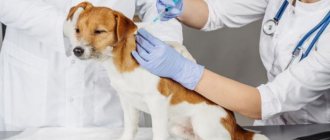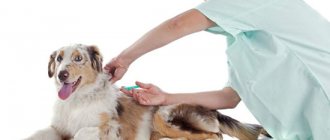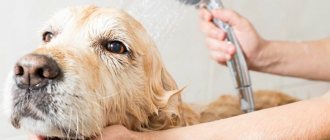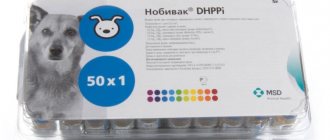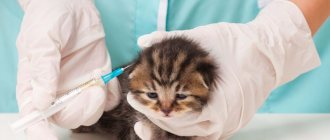Why do dogs need vaccinations?
Many of the diseases that vaccination can protect against are fatal to the dog and dangerous to its owner. Among the most common infectious diseases are rabies, plague, parvovirus and coronavirus enteritis, viral hepatitis, parainfluenza, leptospirosis and some others. You can get a recommendation from your veterinarian about what vaccinations your dog needs.
Vaccination should be carried out within the specified time frame; the puppy has antibodies in its blood from its mother’s milk, which last up to 1.5 months. Then the defense weakens. At this moment the first vaccination is needed. It is necessary to protect your pet from dangerous diseases as early as possible, but you cannot vaccinate too early, as an immune response may not be formed.
Which vaccine to choose
The final choice of vaccine remains with the veterinarian. It takes into account the epizootological state (presence of outbreaks and permanent foci of diseases in the territory) of the region and area where the animal lives.
From these data and medical history, the doctor makes a conclusion about your pet’s health and selects one or another drug to prevent diseases.
The general consensus is that it is optimal to use a complex vaccine that will protect your pet from many diseases at once.
Popular vaccine brands
Nowadays in Russia complex vaccines of the following brands are more often used:
Polyvalent vaccine for dogs Eurikan
- Nobivac (Netherlands)
- Eurican (France)
- Biocan (Czech Republic)
- Hexadog (France)
- Vanguard (USA)
- Duramune (USA)
- Geksakanivac (Russia)
- Dipentavak (Russia)
- Biovac (Russia)
- Multikan (Russia)
Also, the Rabizin and Rabican vaccines are widely used to protect against rabies. Typically, the name of the vaccine includes the brand name and, in most cases, certain capital letters. These designations will tell you what diseases the vaccine is used to prevent.
What diseases is the vaccine intended to protect against?
| Vaccine name | What pathogens are included in the vaccine? |
| Nobivac Puppy DP | Canine distemper, parvovirus (vaccine for early immunization of puppies) |
| Nobivac DHP | Canine distemper, adenovirus, parvovirus |
| Nobivac DHPPi | Canine distemper, adenovirus, parvovirus, parainfluenza |
| Nobivac Lepto | Leptospirosis (2**) |
| Nobivac Rabies | Rabies |
| Nobivak RL | Rabies + leptospirosis (2**) |
| Nobivak KC | Parainfluenza, bordetellosis |
| Eurikan DHPPI2-L | Canine distemper, adenovirus, parvovirus, parainfluenza, leptospirosis (2**) |
| Eurikan DHPPI2-LR | Canine distemper, adenovirosis, parvovirosis, parainfluenza, leptospirosis (2**), rabies |
| Hexadog | Canine distemper, adenovirosis, parvovirosis, leptospirosis (2**), rabies |
| Biocan Puppy | Canine distemper, parvovirus (vaccine for early immunization of puppies) |
| Biocan DHPPi | Canine distemper, adenovirus, parvovirus, parainfluenza |
| Biocan DHPPi + L | Canine distemper, adenovirus, parvovirus, parainfluenza, leptospirosis (3**) |
| Biocan R | Rabies |
| Biocan S* | Coronavirus |
| Biocan DHPPi + LR | Canine distemper, adenovirus, parvovirus, parainfluenza, leptospirosis (3**), rabies |
| Vanguard Plus 5 | Canine distemper, adenovirus, parvovirus, coronavirus, parainfluenza, leptospirosis (2** or 4**) in various combinations |
| Duramun Max | Canine distemper, adenovirus, parvovirus, coronavirus, parainfluenza, leptospirosis (4**) |
Multikan (1, 2, 4, 6, 7,  | Canine distemper, adenovirus, parvovirus, coronavirus, leptospirosis (2**), rabies in various combinations |
| Biovac-DPAL | Canine distemper, adenovirus, parvovirus, leptospirosis |
| Hexakanivac | Canine distemper, adenovirus, parvovirus, leptospirosis |
| Dipentavak | Canine distemper, adenovirosis, parvovirosis, leptospirosis (2**), rabies |
| Rabikan | Rabies |
| Rabizin | Rabies |
* in unfavorable epizootic conditions ** number of different types of Leptospira in the vaccine
The combined use of the Biocan DHPPI and Biocan LR vaccines is provided by the manufacturer and is convenient[/caption]Often the manufacturer provides for the joint use of “their” vaccines. So, for example, with the simultaneous administration of Nobivac DHPPi and Nobivac RL, we will safely receive comprehensive protection for the dog against all diseases included in both vaccines.
The combined use of Biocan DHPPI and Biocan LR vaccines is approved by the manufacturer and is convenient
The strain of adenovirus infection included in vaccines for dogs belongs to type 2. But it protects not only from respiratory diseases, but also from viral hepatitis, caused by a similar type of adenovirus.
Dogs that are often near bodies of water or have frequent contact with rodents should choose a vaccine with as many types of leptospirosis as possible (Duramun Max, Vanguard Plus 5 L4): such animals have a much higher risk of encountering a dangerous disease. This approach is also required for hunting dogs.
The opinion that it is not necessary to vaccinate an older animal is wrong. Elderly animals are seriously ill and have a greater chance of an unfavorable outcome of the disease.
Some vaccines (“Duramun Max”, “Vangard Plus”, “Multican”) also protect against coronavirus - the causative agent of coronavirus enteritis - their use is indicated in nurseries, shelters, breeders and other places where dogs are kept crowded.
Vaccination against another of the causative agents of “kennel cough” - Bordetella bacillus (Nobivac KC) has successfully proven itself. It is also used when there is a high probability of this disease occurring, for example, in places where animals are kept and large dog kennels.
Vaccines for dogs
Vaccines have a long-term effect and form active immunity. Be sure to check the expiration date before vaccination; expired vaccines do not work. Storage conditions must also comply with the instructions.
- Monovalent vaccines. Consist of antigens of one disease.
- Polyvalent vaccines. They form immunity against several diseases. It is better to use them for adult dogs to support already developed immunity. They are more difficult for dogs to tolerate than monovalent ones.
What to choose - ours or imported ones?
Modern domestic vaccines receive quite high ratings, but most veterinarians prefer high-quality foreign vaccines that have been tested by time. Among them are the Nobivak and Eurican brands. As a rule, veterinarians do not consult with the owner about which vaccine to use. The only question that arises is price. The veterinarian does not explain the mechanism of action on the dog’s body.
What are vaccines for?
- It is better to vaccinate against the plague “Vakchum”, 668-KF, EPM are Russian anti-plague drugs.
- “Cultural rabies phenol vaccine” is an anti-rabies for dogs.
- Parvovac is a vaccine against parvovirus enteritis and viral hepatitis .
Foreign suppliers offer a large number of multicomponent vaccines .
Puppies are vaccinated against rabies, adenovirus, parainfluenza and parvovirus enteritis, distemper. For young dogs, they are revaccinated against the same diseases and also vaccinated against leptospirosis. An adult dog against rabies in accordance with the vaccination schedule.
The need for vaccination against giardiasis, Lyme disease, and coronavirus enteritis depends on the area where you live and the type of employment of the dog.
Primary vaccination
Protecting your pet's health is the result of vaccination. But it is worth remembering that not every dog is vaccinated against every infectious disease.
This is an important point that must be discussed with a veterinarian. Most doctors tend to administer polyvalent vaccines, which include several different types of virus strains. Vaccinations are divided into:
- basic;
- not basic;
- not recommended.
The main vaccines are considered vital - against parvovirus enteritis, plague, infectious hepatitis and rabies.
Vaccinations against leptospirosis, borreliosis and piroplasmosis are not the main ones. This includes vaccines against parainfluenza, trichophytosis and dirofilariasis.
The puppy's first vaccination should be done at 8-9 weeks of age. The vaccination is repeated at 12 weeks. Before 8 weeks of age, it makes no sense to get vaccinated, since the colostrum received from the mother contains a high amount of specific antibodies in the blood, interfering with the full development of one’s own immune response.
When babies reach the age of 6-12 weeks, the titer of antibodies in the bloodstream of puppies gradually decreases, and the susceptibility to infectious diseases increases. A persistent immune response to the vaccine is formed in the body of a young animal 10-14 days after vaccination. This period of time is characterized by a significant decrease in its own immunity and the puppy is susceptible to infections. After repeated administration of the necessary vaccine, final immunity to infectious diseases will be formed only after 14 days.
The first vaccinations are given at the age of 4-6 weeks against canine distemper and parvovirus enteritis. Early vaccination is carried out only on the recommendation of a doctor if the risk of infection for puppies is high.
At the age of 8-9 weeks, they are vaccinated against canine distemper, infectious hepatitis and parvovirus enteritis.
Next, it is necessary to vaccinate after changing baby teeth against leptospirosis, parvovirus enteritis and infectious hepatitis.
Puppies are vaccinated against rabies when they reach 12 weeks of age. The vaccination is done once, and revaccination is required only after 12 months.
Veterinarians draw the attention of puppy owners to the fact that there is a certain period in the life of babies when the female’s immunity, transmitted through mother’s milk, loses its strength, and that received as a result of vaccination has not yet formed. At this time, it is important to carefully monitor the condition of the puppies, avoiding contact with sources of infection, protecting them from stressful situations and overwork.
An important point is food that is complete and balanced in terms of components. It should contain the necessary vitamin and mineral complexes. After vaccination, long walks are prohibited for 12 days, and long trips must be avoided.
Find out more about when you can walk your dog after vaccination>>>
Preparation for vaccination and its cost
- Observe the dog's condition. Vaccination is given only to healthy animals. The puppy needs to measure its temperature for a week before vaccination, monitor the condition of its stool and mucous membranes.
- Deworming before each vaccination.
- Avoid walking with the puppy before vaccination, do not let them into the hallway, and remove dirty shoes.
- Provide proper and nutritious nutrition for your dog.
- The interval between vaccinations should be at least 3 weeks.
Should I vaccinate at home or in a clinic? This question worries many owners. The clinic stamps it and the procedure is cheaper. Sometimes the rules for storing vaccines are not followed. The ideal option would be to call a trusted doctor at home from a good clinic. The veterinarian can take the passport with him and stamp it at the clinic. A puppy that is vulnerable to infection will be safe in a calm environment.
After vaccination, do not wash the dog, do not tire it, and let it sleep more. Feeding should be complete. Limit contact with other dogs. You cannot walk with the puppy for 2 weeks after vaccination.
How much do dog vaccinations cost? In Moscow, calling a veterinarian to your home for vaccination will cost from 500 to 2500 rubles, depending on the vaccine. In veterinary clinics, the cost of vaccinations for dogs ranges from 300 to 1000 rubles, with an average of 500 rubles.
How to prepare your dog for vaccination
Vaccination is a rather serious procedure for which you should prepare. To do this you need:
- 2-3 weeks before the scheduled date, carry out deworming;
- “forget” about walks to avoid contact with any dogs;
- 5 – 7 days before the visit to the doctor, monitor the condition of the four-legged animal;
- do not feed the dog before vaccination (3.5 – 4 hours);
- if the pet is afraid, it is better to be nearby, pet it and talk to it.
Deworming – treatment against internal parasites. They give deworming tablets, which can be purchased at a veterinary pharmacy. The body must be completely “cleansed” of worms and other parasites.
Vaccination schedule for dogs
What vaccinations are given to dogs and when? The puppy's first vaccination is against enteritis or hepatitis. A bivalent vaccine can be used. Revaccination is carried out after 10-14 days. This vaccination is easily tolerated. After two weeks, stable immunity is developed. A year later the vaccination is repeated.
At 2.5 months, a plague vaccination is carried out. You cannot walk your puppy for 3 weeks after vaccination. The puppy is vaccinated again at 6-7 months, when the growth of permanent teeth ends.
At 8 months the dog is vaccinated against rabies. It can be done from 6 months, but due to anti-plague revaccination, it can only be done at this age. How often should my dog be vaccinated against rabies? The next vaccination should occur 12-13 months after the previous one.
Re-vaccination against most diseases is carried out every year.
Puppies are given polyvalent vaccinations against a wider range of diseases. The owner is simply obliged to protect his pet from the most dangerous diseases.
Veterinarians can offer their own vaccination options . The most popular is presented below. For convenience, a table is provided.
Vaccine delivery
If vaccination is performed in a medical facility, then the owner should not worry about methods of transportation and storage of the medicine. Typically, vaccinations are supplied to clinics by trusted pharmacological companies. Personnel must strictly adhere to the rules and terms of storage of the drug.
When purchasing the vaccine yourself, it is better to familiarize yourself with the methods of its transportation in advance. You can find out about this from the electronic version of the annotation for the drug or ask at the pharmacy where the purchase will be made. If the drug is handled incorrectly, it will quickly lose its properties and be ineffective.
For transportation you will need a cooler bag. Therefore, it is necessary to take care of its availability in advance and freeze the cooling element. At home, the drug is stored in the refrigerator.
After the first vaccination, you should save the packaging of the drug, since during revaccination it will be necessary to use exactly the same drug.
You can get any vaccination yourself, except the rabies vaccine. It is done only in a veterinary institution and a special mark is made in the passport. Since the disease is especially dangerous for both animals and people, special attention is paid to it. Data on the manipulation is compiled into a special register and transferred to the state animal control service.
Video about dog vaccination
Watch the video where experienced breeders give their vaccination recommendations .
Owners most often have questions regarding the timing and manufacturer of the vaccines. Also, many people are confused about the schedule of when to get vaccines. It is best to find a good veterinarian who will treat your dog and give all vaccinations. Then you can get timely and competent advice. Share your experience of vaccinating your dog.
Share
Leave a review
Briefly about the main thing
- Vaccinations are a mandatory annual procedure to prevent dangerous infectious diseases.
- It is necessary to vaccinate according to schedule for the drug to be effective.
- A deadly, zoonotic disease on the territory of the Russian Federation is rabies.
- It is better to use an associated vaccine to prevent a number of dangerous diseases
- Weakness and malaise after vaccination are a normal state of any living organism.
- Vaccination against rabies is mandatory and is carried out free of charge in state veterinary clinics.
What determines the cost of puppy vaccinations?
The price of vaccination primarily depends on the vaccine manufacturer. Domestic products are cheaper than imported ones. However, this is not an absolute rule. Some Russian vaccines are more expensive than their foreign counterparts.
The cost of a vaccine is directly related to the complex of diseases against which its action is directed. The wider the spectrum of action, the more expensive the product.
The chosen clinic where the procedure is to be performed also affects the cost. If you order a vaccination at home, you will need to pay 500 rubles more than when visiting a clinic.
In Moscow, vaccination of puppies and adult dogs is more expensive than in other cities and regions.
Type of vaccine
Vaccines that protect animals from infectious and viral diseases are divided into 2 groups:
- monovalent
- complex.
The first ones promote stable immunity against a certain disease and reduce the heavy burden on the animal’s body.
Complex (polyvalent) drugs create immunity against several diseases simultaneously, since they contain a complex of antigens. Polyvalent drugs eliminate the need for several injections at once and reduce stress for the animal. Both types of vaccines have a prolonged (long) effect.
Situations when it is better to postpone vaccination
- Bearing and feeding puppies;
- Planned mating. Only vaccinated animals are allowed. But more than a month must pass after the injection;
- Illness, or simply feeling unwell;
- A long journey is planned. After vaccination, the animal needs quarantine and rest.
Vaccination is an unpleasant procedure, but you cannot do without it. If you choose high-quality complex medications and follow the recommendations of specialists, your four-legged friend will easily cope with the load and will delight you for many years.
What diseases require annual vaccination?
An adult dog must be vaccinated annually, but if the animal was adopted as an adult and there is no data on its vaccinations, vaccination is done as soon as possible (provided that the animal is healthy).
Repeated administration of the vaccine to an adult dog is carried out after 1 month and then according to the schedule (once a year). There are situations when an adult animal is vaccinated, but it was vaccinated not so long ago. Repeated administration of the vaccine can cause serious complications in the dog, so if the animal is picked up from the street, it is better to test the dog’s blood for the presence of antibodies.
Veterinarians recommend vaccinating older dogs once every 3 years, since any vaccination is a serious burden on the body. It is not advisable to vaccinate older dogs with chronic diseases, the only exception being vaccination against rabies.
Healthy adult dogs are vaccinated annually against the following diseases:
Parvovirus enteritis. The disease is widespread and kills many dogs. The virus has a destructive effect on the liver, intestines and pancreas of the animal. Parvovirus is especially dangerous for puppies, as it quickly leads to dehydration and death;
Rabies. A terrible viral disease of all warm-blooded animals, including humans. As a result of the disease, the central nervous system is destroyed and 100% death occurs. Veterinary legislation in almost all countries requires every dog owner to have an annual vaccination against a fatal disease;
Parainfluenza. Characterized by an inflammatory process of the upper respiratory tract. Parainfluenza does not pose a mortal threat to the animal, but often results in complications in the form of pneumonia, so the best option to avoid infection is vaccination;
Viral hepatitis. In young pets, the disease often occurs in a fulminant form and the animals often die; in mature dogs, the disease mainly becomes chronic;
Plague of carnivores. A highly contagious disease that is difficult to treat. In most cases of distemper infection, the four-legged friend dies from damage to the central nervous system;
Adenovirus. An infectious disease accompanied by digestive disorders and cough. The disease is dangerous due to complications such as dehydration and the development of pneumonia;
Leptospirosis. An infectious disease of many animals, as well as humans. Accompanied by damage to the digestive organs and jaundice.
Coronavirus. Another viral infection that causes enteritis in animals.


